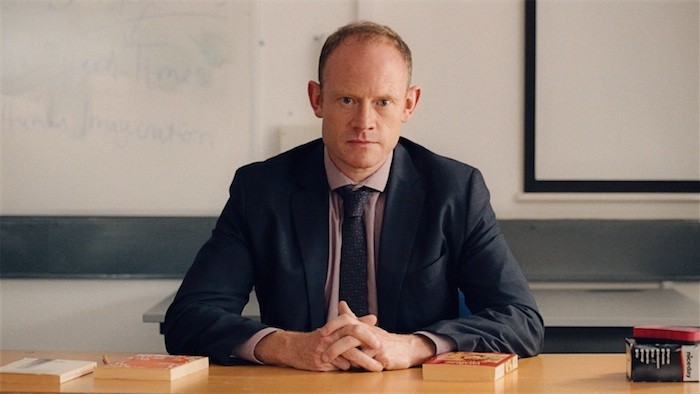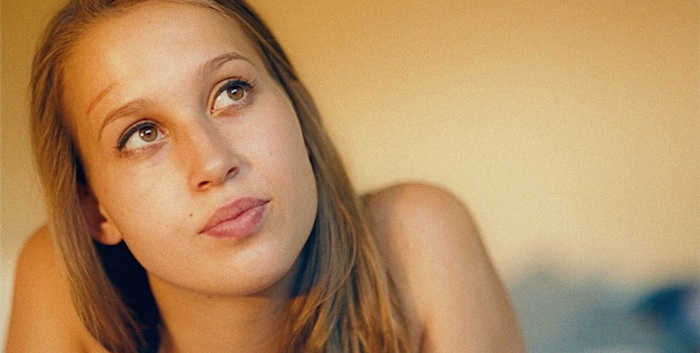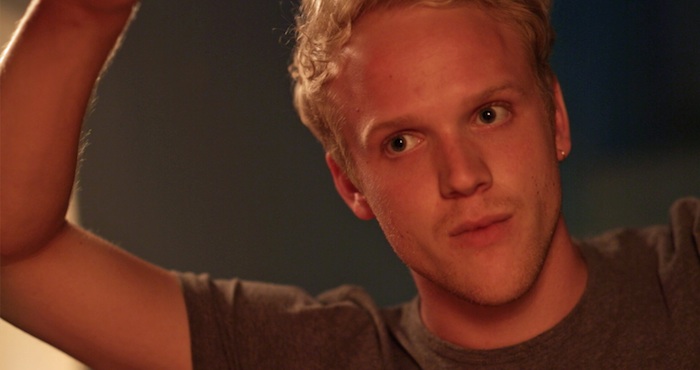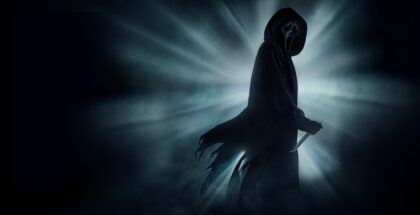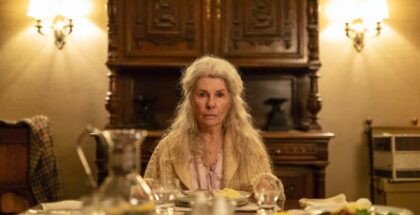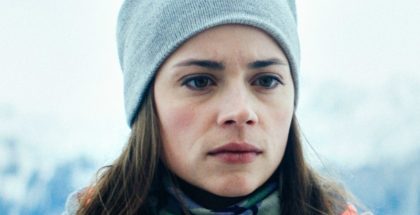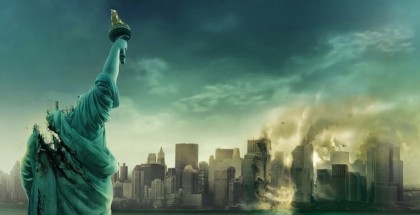Interview: Ruth Platt, director of The Lesson
Matthew Turner | On 28, Feb 2016
Monday 29th February spells good news for horror fans, as FrightFest Presents a fresh wave of scary films to stream. The digital label, which was launched last year by the festival and Icon, brings the best of the fest’s spooky offerings straight to VOD.
One of 2016’s first FrightFest Presents flicks is The Lesson, which sees a teacher at the end of his tether decide to teach two troublesome schoolboys a lesson they will never forget. We chat to director Ruth Platt about education, horror and the directors that have influenced her.
Where did the idea come from?
People often ask me this, because I do still do a little bit of teaching and people assume it’s sort of autobiographical frustration that’s oozing out. But it comes from further back than that and a few complex strains of inspiration, really. I went to quite a big, rough state school and I was a bit of a geek, I didn’t have a very good time. I remember observing, just as a sort of coping mechanism, the kind of classroom dynamic and the “soft touch” teachers, like if there was a teacher that was nervous, the kind of collective dynamic that would happen. And I remember we once locked this history teacher in the stationery cupboard and he burst into tears and just thinking, ‘How does that happen? We wouldn’t do that with another teacher’, you know. I have taught, I have observed that happening from a teacher’s point of view as well. And then I’m very interested in education and the failing areas, the good areas, where we let students down, where we let teachers down. I remember reading an article a few years ago about a teacher who had no previous history of violence, a very, very good teacher of 20 years, who suddenly lost it with a teenage boy and caused him serious head injuries. And it was so sudden, with no kind of previous warnings. And I just thought, what happened psychologically to allow that scenario to unfold? That was kind of a gestating point, I think.
What have you learned from teaching then, in terms of not being that history teacher that gets locked in the cupboard? Do you make an example of somebody on the first day, that sort of thing?
No, I think that’s – I mean, there are teachers that were like that. You know, very, very fiercely disciplinarian. You mustn’t want to be liked – that’s very important. But I think you have to be much more upfront and you have to be quite aware of yourself, and if you have a sort of centre, and you – I mean, kids are quite savvy, and if you’re quite upfront and very to the point and engage them in a way that makes them feel like they understand what you want from them, then it’s an interactive process. It’s been a learning curve, but I think now, I kind of get it.
Were there any particular film influences on The Lesson? Did you watch any films to prepare?
A massive influence for me is Michael Haneke’s Funny Games. I do love the horror genre, but I am quite specific about which horror films I like and which ones I really abhor. And I really don’t like the exploitative torture porn genre – a lot of people say, ‘Oh, it’s a torture porn film’ and that worries me slightly, because I think The Lesson’s quite anti-torture porn; I think it’s a challenge to the genre in the way that Haneke’s Funny Games is a challenge to the horror, gratuitous violence genre. I wouldn’t ever say that my film is like Michael Haneke’s, but I think it’s inspired by it – you know, this unspeakable thing happens in Haneke’s film at the end that the audience cannot find any gratification in. And I tried to do something similar, where it just isn’t gratifying, the violence, it’s actually painful and difficult to watch and you hopefully care about the characters.
We like the fact that there was an actual lesson in The Lesson – you could imagine him planning it out beforehand. What do you hope people take away from the film in that respect?
Well, I suppose, because there’s teenage protagonists, it combines this coming-of-age summer story with this lesson. And I suppose I’m thinking teenagers might be watching so I was hoping they would get this horror movie genre, but also some kind of intellectual rigour to it as well, which I think would be good, because you don’t often get that in the horror genre. I mean he does bang on a lot, the teacher, he’s got this captive audience, and that’s a slight worry, does it hold people’s attention? But then again, I just thought, I want to make an uncompromising film and I’m going to take that risk.
What was the hardest thing to get right, overall?
We had a very, very, very small budget. Just not enough money. So we used a lot of first-time young actors. We were very limited in the days we could shoot, we had very few lights, a very, very skeleton crew. All those things meant compromises had to be made. I wanted to do a lot of takes, I wanted to do a lot of long takes, all those things had to be compromised because of time. We were hallucinating from lack of sleep towards the end and it was very hard to get the number of shots we needed. So the hardest thing to get right was the compromises that you have to make, finding useful creative compromises within the pressures of the budget. But also the fact that this lesson is so uncompromising and so long and substantial and getting that to work within a narrative framework that still keeps you on the edge of your seat, that was very hard to get right.
How long was the shoot?
We did 18 days, with one day off, and it was pretty much 13 hour days.
How did you go about casting the leads?
I’d work with Robert [Hands] a while ago, on Heartbeat, and I’d been struck by his very truthful kind of approach to acting and character work and he’s got this very gentle side, but I also knew he had another side to him that could create this very complex, tormented character. But it was very important that you really believed he was a soft touch teacher who had that kind of integrity and then suddenly lost it. So I wrote it with him in mind, as I sometimes do. I knew Evan Bendall, the lead guy, I’d worked with him on something small and I worked with him a lot before I offered him the role. I made him read it a lot with me, go through the thought processes. He was a similar age, he was 18 at the time, so just getting him to find that resonance within himself and the character. And then Rory [Coltart], I was very lucky to find last-minute – I did a workshop in a local college in Oxford and they were showing these kind of big bully type guys and then Rory walked in, quite unassuming in kind of stature but just incredible sort of quiet menace about him and I just knew instantly he was right for Joel. And that was a very hard character to cast.
What about Michaela Prchalová?
I actually had another Czech actress in mind, but she had visa issues and Misha was at the Conservatoire with this other actress and I saw her on Facebook and I had a Skype meeting with her. I cast her about two days before her scenes were going to be shot. And she didn’t speak much English, but she worked incredibly hard, and again, she had this very, very natural approach to acting, a really sort of lovely openness about her and she’s very, very, very photogenic, she has a real beauty, she was 18 at the time, a real sort of natural beauty that I think is very fascinating on camera.
You say you almost cast another Czech actress. Is it coincidence that they’re both Czech?
Well, I’d met this other actress, because my partner and I worked in Prague for a while and had met this actress and I did want to have an Eastern European actress – she could have been Polish, she could have been Macedonian, Serbian, or Czech, but because I’d met this actress and liked her very much, I wrote it thinking about her playing the part. Although, actually in the film, she’s actually Serbian, because Dolya Gavanski, who plays her mother, speaks Serbian as well. So they speak Serbian, which is another Slavic language, so you can kind of get away with it. But it was important, because there’s this theme of these kind of white foreigners infiltrating a sort of white rural class, rural working class community, and this kind of weird dynamic that’s set up with Fin saying, ‘Well, you can’t be foreign if you’re English’. And that’s happening in these kind of white rural class fringes of towns where it’s all a bit scruffy and a bit scabby, but there’s something going on where there’s this Eastern European population thriving and growing and it’s causing tensions and how they get around that, so I wanted that to be a sort of sub-theme, if you know what I mean.
How aware are you of being a female horror director and does it come with its own set of pressures?
I just see myself as a filmmaker, but I do suppose that – in fact, the next film I want to make is a largely female cast and a female perspective on the supernatural. Obviously, everyone thinks about Jennifer Kent and The Babadook and how that kind of exploded the idea of women in horror. But I suppose there have been other people working on a sort of lower profile for a while now. Obviously, a big thing for me is misogyny in horror – because I love horror and seeing stereotyped women and misogynist themes and the gratification of violence against women and the fetishisation of violence against women is something I find very difficult. So I wanted to reclaim horror in a way and I think there are a few women doing that now reclaiming horror and telling different stories from a different point of view.
Which other female horror directors have stood out for you?
Well, definitely Jennifer Kent and The Babadook. What I loved about that film was another thing that’s difficult in the portrayal of women in film is mental illness and I think she did a brilliant job of creating this character who was dealing with bereavement and grief and mental illness without these horrible stereotypes of ‘She can’t parent, she’s a bad parent, she’s a bad mother’ and the way she worked that through. This was really interesting, I thought. Yeah, so she’s a big influence. I’m trying to think of other female horror filmmakers…
Well, that’s sort of the point – it’s a small club.
I probably should know more, but I’m so focused on just making my name and making my mark, but it would be nice to have more awareness and contact with other women working in the genre, but unfortunately, it still feels very sort of fragmented.
Do you plan to stay within the horror genre?
Not necessarily. There is another film I want to make that’s quite violent and quite dark, but I don’t want to stay solely in the genre. I just want to tell stories and create interesting characters.
Your film is coming out on FrightFest Presents. How important is Video On Demand to the future of horror cinema and distribution?
Yeah, it seems to be changing the whole dynamic of the industry. I think, especially for horror, it seems to be very important, VOD, because maybe the audience out there that’s wanting horror. And also, just from my point of view, creating very interesting horror that’s slightly indie, slightly from a different angle from the mainstream horror, it may not find a theatrical release because it is still the horror genre, it’s going to be quite niche, the market, so to find our place in VOD is great because we can offer something very different and not mainstream, so it’s good for us.
Are you much of a VOD fan yourself?
I tend to, nowadays, because I work quite late every day and I’ve got two young kids, so I do tend to watch quite a lot of world cinema and horror genre stuff on Sky or Netflix. So, yeah, it is the way I’m consuming my cinema, quite a lot, actually, at the moment.
What have you seen recently on VOD that you’ve enjoyed?
I’ve seen A Girl Walks Home Alone at Night. That’s a female filmmaker, actually. So I don’t get to see a lot of world cinema, because I don’t live in London and there’s not a lot of world cinema that comes to Oxford. There’s the Phoenix but I don’t often get to go there and the runs are very short, so it’s great to be able to seek out stuff like that. I thought it was an incredibly interesting film, very beautiful. So I got to see that and I got to see Dogtooth, which is one of my favourite films of all time through Sky. So, yeah, I do manage to see some really interesting stuff on demand, which is great – if I’ve missed it at the cinema, then I can go back and see it a couple of months later.
What’s your horror history, so to speak? Do you have a favourite horror film? Do you remember the first film that got you into horror?
Yes, my first experience was Alien, Sigourney Weaver and to see that woman, in that role, for me as a kid, I was blown away, because I’d never seen a woman like her. She was a protagonist in Alien and she didn’t have any of the stereotypes going on that you usually see with women and for me, it was so paradigm-shifting and life-changing that that’s when I really wanted to make films. And I was a bit confused, I thought, well, do I want to be an actress? I didn’t quite realise and work it out until later that I just wanted to be a filmmaker, but it was her and that film that sparked my love of horror and that whole female protagonist thing. Even though The Lesson has far more male characters and there’s only one or a couple of female characters, they are pivotal and quite subversive in their own way. And the next film I want to make is very female-driven, so yeah, Alien really sparked everything for me, my whole love of film and the genre. And, of course, the other Aliens – even the third one was quite interesting – but the first two, definitely.
Who are your biggest horror influences?
I’m not very good at name-dropping with Asian cinema, but I do love Asian films like Audition, The Ring, that very, very dark, uncomfortable supernatural metaphor for unspoken things is very interesting and they do that very well in Asian horror and they’re very, very uncompromising. Haneke, Guillermo Del Toro, I love the way Del Toro weaves in a social commentary to ghost stories.
I was wondering if The Lesson had been influenced by any British school films, such as Unman, Wittering and Zigo, or If…? Or even Grange Hill?!
[Laughs] Not really, no. I have seen If…, that’s quite stylised but yes there is a definite subversive, boy, testosterone-filled thing going on. But it wasn’t so much of an influence, I mean The Lord of the Flies was an inference, I suppose. Reading that as a child. And seeing kids around me, obviously not all the kids were like that, but seeing that potential in people and in children. But it was more sort of personal experience of being both at school and being a teacher and observing that classroom dynamic, that’s where the story emerged.
You mentioned earlier you still do a bit of teaching. Are you a professional teacher? What’s your background?
I didn’t train as a teacher, I’m a drama teacher, so I’m peripatetic. I trained as an actress and worked an actress for a few years and then started trying to work my way into films, just to earn a living. Because I’ve never had a film funded by an external agency, it’s always beg, borrow and save, it’s always micro-budget.
You haven’t directed episodes of television or anything like that?
I haven’t. I would like to but I worked as an actress until I had my two young children and now I’m sort of clawing my way back to a career. And that’s another thing that women face – there’s quite an interesting quote which is, ‘Women should work as if they don’t have children and they should be a mother as if they didn’t have a job’. And I think that’s a sort of paradox that working mothers face all the time. It’s the paradox that women live with – if you have children you’re supposed to mother like you don’t work and you’re supposed to work like you don’t have children and it’s very difficult, especially in a creative job, to marry the two.
The Lesson is available to watch online on Amazon Prime Video as part of a Prime membership or a £5.99 monthly subscription.


